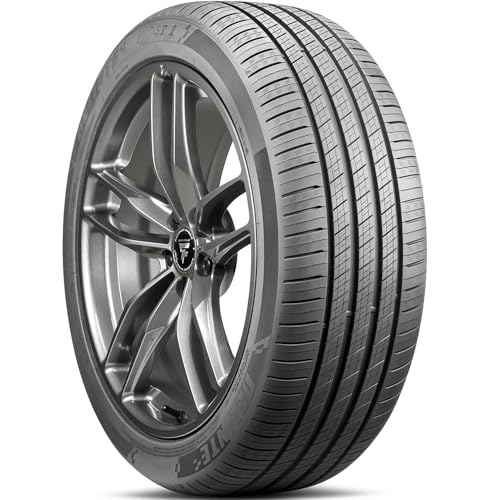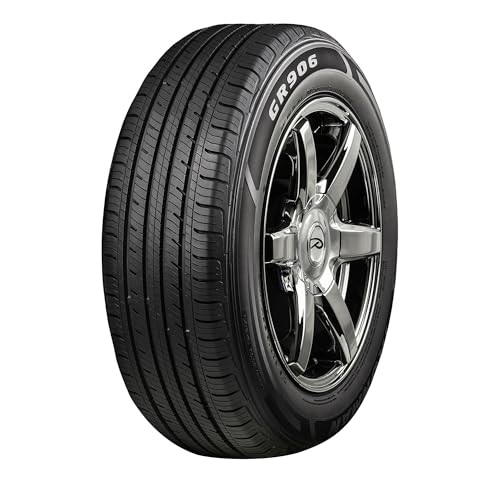10 Best Car Tires [2025]
This post contains affiliate links. As an Amazon Associate, we earn from qualifying purchases.
Finding the best car tires for your vehicle can be a daunting task, especially with the myriad of options available on the market today. With varying performance, durability, and price points, it’s easy to feel overwhelmed when trying to make the right choice on your own. To simplify this process, we carefully shortlisted 10 products based on expert reviews, customer feedback, and rigorous testing. Our curated list not only highlights the top contenders but also saves you valuable time and hassle in your search for the perfect tires to meet your needs.
Top 10 Car Tires In The Market
Car Tires Review
- Treadlife: N/A
- Tires Only
- Season: All Season, Performance: High Performance
- Car Type: Passenger
- Load Range XL, 4-Ply Rated, 4-PR
- Treadlife: N/A
- Tire Only
- Season: All Season, Performance: High Performance
- Car Type: Passenger
- Load Range XL, 4-Ply Rated, 4-PR
- All Season Tire
- Speed rating: V
- Load index: 91.0
- Section width: 205
- Enhanced tread compound and profile provide all-season traction
- Offers drivers a smooth ride with controlled handling
- Deep, lateral shoulder grooves allow for excellent traction throughout the life of the tire
- Smooth ride with controlled handling
- Rim Diameter:15
- Treadlife: N/A
- Tires Only
- Season: All Season, Performance: High Performance
- Car Type: Passenger
- Load Range XL, 4-Ply Rated, 4-PR
- Optimized tire contact area with the road: For enhanced handling and responsiveness
- Biting edges: Help to provide confident all-season traction in wet, dry and snowy conditions
- Optimized tread pattern: Helps to quiet noise from on-road driving
- Treadlife: N/A
- Tire Only
- Season: All Season, Performance: Performance
- Car Type: Passenger
- Load Range XL, 4-Ply Rated, 4-PR
- Treadlife: N/A
- Tires Only
- Season: All Season, Performance: High Performance
- Car Type: Passenger
- Load Range XL, 4-Ply Rated, 4-PR
- All Season Tire
- Speed rating: H
- Load index: 95.0
- Load capacity: 1925
- Designed for use on performance-oriented vehicles in warmer weather conditions
- Backed by a 50,000 mile limited manufacturer tread life
- Wide, lateral grooves enhance hydroplaning resistance by efficiently evacuating water out of the tread
- V-shaped tread pattern improves traction and braking performance when driving at higher speeds
- Computer optimized design lowers road noises and vibrations to create a quiet, comfortable ride for drivers and passengers
Our Review Process
To ensure you get reliable product recommendations, we follow a detailed review methodology that includes:
- Market Research: Scanning best-selling and trending products in this category.
- User Feedback: Reviewing customer reviews, star ratings, and complaints.
- Hands-On Testing: Trying select products ourselves when feasible.
- Feature Comparison: Evaluating specs, durability, pricing, and safety.
- Expert Opinions: Consulting with niche experts or credible reviewers.
We independently select the top 10 options based on value, quality, and usability. To learn more, visit our detailed review process.
Key Considerations Before Buying Car Tires
1. Tire Type
Understanding the different types of tires is crucial. There are summer tires, winter tires, all-season tires, and performance tires, each designed for specific conditions. Consider your typical driving environment, climate, and driving style when selecting the type of tire that best suits your needs.
2. Tire Size
Tire size is an essential factor for compatibility with your vehicle. Refer to your car’s owner manual or the sidewall of your current tires to find the correct size specifications, which include width, aspect ratio, and diameter. Choosing the incorrect size can affect handling, safety, and fuel efficiency.
3. Tread Life
Tread life refers to how long a tire is expected to last before it needs replacing. Look for the treadwear rating, which can give you an idea of durability. Higher ratings generally indicate longer-lasting tires. Consider your driving habits and how often you drive to determine the best tread life for your needs.
4. Performance Ratings
Performance ratings reflect how well a tire performs under specific conditions, such as wet or dry traction, handling, and ride comfort. Research tire reviews and comparisons to find options that offer the best performance for your vehicle and driving conditions.
5. Price and Budget
Tires come in a wide range of prices, so it’s essential to set a budget. While higher-priced tires often offer better quality and performance, there are also budget-friendly options that perform adequately. Balance your budget with the factors of safety and durability, as investing in quality tires can save you money in the long run.
6. Brand Reputation
Some tire brands have built a reputation for quality and reliability. Research various brands and read customer reviews to gauge their performance and durability. Trusted brands often provide better warranties and customer service, making them a safer choice.
7. Seasonal Considerations
Depending on where you live, seasonal weather changes can significantly impact tire performance. In regions with harsh winters, investing in dedicated winter tires might be necessary, while areas with mild climates may benefit from all-season tires. Consider your local climate when making your decision.
8. Installation and Maintenance
Proper installation and maintenance are vital for tire performance and longevity. Consider costs associated with professional installation and regular tire maintenance, such as rotations and alignments. Ensure that the shop you choose is reputable and knowledgeable about tire care.
9. Warranty and Return Policy
Check the warranty that comes with the tires and understand what it covers, including treadwear guarantees and road hazard protection. Additionally, familiarize yourself with the return policy in case the tires do not meet your expectations or have manufacturing defects.
FAQs
What are the different types of car tires?
There are several types of car tires, including all-season tires, winter tires, performance tires, and off-road tires. All-season tires provide a balance of traction and durability for various conditions, winter tires are designed for cold weather and snow, performance tires offer enhanced handling and speed, and off-road tires are built for rugged terrain.
How often should I check my tire pressure?
You should check your tire pressure at least once a month and before long trips. Proper tire pressure is crucial for safe driving, fuel efficiency, and the lifespan of your tires.
What is the recommended tire pressure for my vehicle?
The recommended tire pressure can usually be found on a sticker inside the driver’s door frame or in the vehicle’s owner’s manual. It varies by vehicle model, so it’s essential to refer to these sources for accurate information.
How do I know when to replace my tires?
Indicators that it’s time to replace your tires include tread wear (you can use the penny test), visible damage such as cracks or bulges, vibrations while driving, or if your tires are older than six years. Regular inspections can help determine their condition.
What is tread wear, and why is it important?
Tread wear refers to the wear and tear on the tire’s tread, which is essential for traction and handling. Proper tread depth ensures safety and performance, especially in wet or snowy conditions. Monitoring tread wear can help prevent hydroplaning and enhance braking efficiency.
Can I mix different types of tires on my vehicle?
It is not recommended to mix different types or brands of tires, as this can affect handling and safety. Ideally, all four tires should be the same type and have similar tread patterns. If you must mix, consult a professional for advice.
How can I extend the life of my tires?
To extend the life of your tires, maintain proper tire pressure, rotate them regularly (every 5,000 to 8,000 miles), align your wheels, and avoid aggressive driving. Regular inspections for damage and proper storage during off-seasons also help.
What are run-flat tires?
Run-flat tires are designed to allow you to continue driving for a limited distance (usually around 50 miles) after a puncture or loss of pressure. They have reinforced sidewalls that support the vehicle’s weight even when deflated, providing added convenience and safety.
How do I properly store my tires?
When storing tires, keep them in a cool, dry place away from direct sunlight. If they are mounted on rims, store them upright; if they are unmounted, stack them flat to prevent deformation. Use tire covers to protect them from dust and moisture.
What should I do if I notice a tire is losing air?
If you notice a tire losing air, inspect it for visible damage, such as punctures or bulges. If you can’t find the source, take the tire to a professional for a thorough inspection. It’s essential to address air loss promptly to maintain safety on the road.
The Bottom Line
In conclusion, selecting the right tires for your vehicle is crucial for ensuring safety, performance, and comfort on the road. Our curated list of the ten best car tires has been meticulously compiled based on extensive research, expert reviews, and user feedback. We considered various factors such as performance in different weather conditions, tread longevity, noise levels, and overall value for money. By focusing on these key attributes, we aimed to provide a diverse selection that caters to the varied needs of drivers, whether they seek all-season versatility or specialized performance tires.
By following our recommendations, you can make a more informed decision when purchasing your next set of tires. This guide serves as a valuable resource to help you navigate through the myriad of options available in the market. Investing in the right tires not only enhances your driving experience but also contributes to your vehicle’s safety and efficiency. We hope this article empowers you to choose the best tires that meet your specific requirements and keep you safe on the road.









